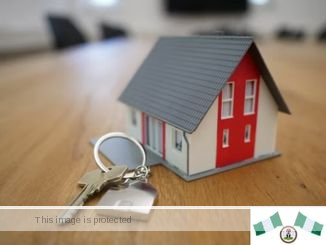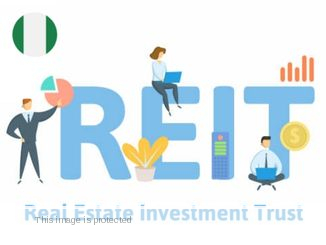How to Invest in Real Estate in Nigeria (Earn ₦17m Monthly)
Real estate investment in Nigeria can take many forms.
If you’re just getting started in real estate, it’s a good idea to learn about the many types of real estate investments so you can figure out which one is right for you.
Real Estate
Real estate is defined as the transactional sale or acquisition of real property, which includes not just the land but also everything permanently related to it.
This includes natural resources and land modifications, such as buildings.
As long as the property is founded on a piece of land, modifications to the property can include new or existing structures.
Real estate can be used for a variety of purposes, including providing housing for people, farming with raw land, and renting commercial property for a business.
Professionals in the real estate sector, such as real estate agents, brokers, and developers, make money by constructing or facilitating the exchange of property.
Real Estate Types
Here are the four basic types of real estate to invest and earn money:
1. Residential Real Estate
Because it has a lower cost of entry and might be easier to finance than commercial real estate, residential real estate is a popular first investment for aspiring real estate investors.
Residential properties are one of the most common types of real estate in Nigeria to invest in, with a variety of housing styles to consider.
Any property used for residential purposes falls under this category.
Residential real estate includes single-family homes, condos, and vacation homes, among other places where people live or stay.
Residential real estate investors make money by collecting rent (or regular payments for short-term rentals) from tenants, or by profiting from the increase in value of their property between the time they buy it and the time they sell it.
Residential real estate investing can take various forms.
It could be as easy as renting out a spare room or as complex as purchasing and reselling a home.
While you can acquire a residential home strictly for investment, you can also rent out extra room in your primary residence to make money.
2. Commercial Real Estate
Apartment complexes, gas stations, grocery shops, hospitals, hotels, offices, parking facilities, restaurants, shopping centers, stores, and theaters are examples of commercial properties.
The second most frequent type of real estate to invest in is commercial real estate (CRE).
Any property that is primarily used for business reasons is classified as commercial real estate.
The increased up-front expense for new real estate investors may make it a less popular investing approach.
However, there are options for investing with a smaller initial commitment, such as crowdfunding or real estate investment trusts (REITs).
Commercial real estate (CRE) is a property that is used solely for commercial purposes or to offer a workspace, as opposed to residential real estate, which is used for living purposes.
Commercial real estate is frequently leased to tenants to conduct income-generating operations.
This vast category of real estate can range from a single storefront to a large shopping mall.
Owning and managing leased commercial real estate necessitates the owners’ full and continuing management.
A commercial real estate management firm can assist property owners in finding, managing, and keeping tenants, overseeing leases and financing alternatives, and coordinating property upkeep and marketability.
3. Industrial Real Estate
Property used to create, manufacture, or produce goods and products, as well as logistics real estate that facilitates the movement and storage of products and goods, is referred to as industrial real estate.
These structures lack the glitz and glam of other types of real estate, such as gleaming skyscrapers, well-kept multifamily neighborhoods, or bustling commercial malls.
Industrial real estate is critical since these properties represent the backbone of the industrial economy.
All land and structures that accommodate industrial activities such as production, manufacturing, assembly, warehousing, research, storage, and distribution are referred to as industrial real estate.
Most people associate real estate with the places where they spend their time: their homes, offices, favorite retail store, or favorite restaurant/bar.
However, when they hear industrial real estate, they may conjure up images of massive brick chimneys spewing foul-smelling smoke or a factory assembly line with computer-assisted machinery putting cars together.
This image may relate to some aspects of industrial activity, but industrial firms go much beyond this picture, working behind the scenes of all these high-traffic areas and essentially providing the fuel that allows them to function.
Each city has defined areas for industrial properties, which are depicted on a zoning map and describe where these spaces can be built and operated so that the activity on these sites does not interrupt companies or residences that might be located nearby.
4. Raw Vacant Land
Land that has been subdivided or where the development process to build residential properties — such as a planned urban development (PUD), townhomes, or commercial real estate — has already begun is often worth more than raw vacant land.
The cost of purchasing land varies based on the size, location, and zoning (or permitted use) of the property.
Farmlands and land with no established commercial or residential development are examples of vacant land.
Natural resources such as mineral, water, and air rights may also be included in this category of investment, which is sometimes referred to as raw land.
Raw land can be bought as a long-term investment in the hopes of capital growth, or for development by another party.
Investors can also buy land and develop it on their own.
Another popular investment method is wholesaling or selling idle land, which often generates profit by adding value.
How Real Estate Investment Works in Nigeria
A real estate investment is a financial strategy that involves the management, ownership, purchase, rental, and/or sale of a property for profit.
Just like what you would see with a real estate company in Nigeria.
Though there are several ways to invest in real estate, they all rely on similar economic factors to earn profit.
The first factor is that the property must increase in value.
The costs involved in owning and maintaining the property must not exceed its increased value.
There are different investment property, and good investors choose their investment strategy based upon their need (short- or long-term) for profit.
Fast turn investing refers to buying a property and selling it quickly (often referred to as “flipping”).
Investing in the long-term means buying a property for rent or lease over a long period, gaining both the rent and the growing value of the property.
What do Real Estate Investment Companies do?
A real estate investment company owns and manages any investment(s) and separates properties held by the company from personal holdings.
It essentially acts as a shelter that provides protection from personal liability.
Who is a Real Estate Investor?
A real estate investor is a person who puts money into a particular property to make a substantial amount of money – as a return – at the end of the day, month, or year.
Therefore, an investor can be a house owner, a developer, a lessor, etc.
Not everyone can be a real estate investor, the reason being that a real estate investor must be someone who can take the risk.
Benefits of Real Estate Investment in Nigeria
Here are the reasons real estate is the perfect investment in Nigeria:
- Investment in landed properties is a safe financial investment that is not affected by political issues, wars, calamities, or disasters.
- You can invest in real estate with little or no knowledge.
- Real estate is a very lucrative investment with a high return in Nigeria. Landed properties appreciate in value over the years.
- The returns from real estate investments in Nigeria provide a stable and passive income.
- Real estate is an excellent investment that is not affected by inflation.
- Real estate gives you total authority over your assets, unlike shares or stocks, where the shareholder dictates decisions to be made for you.
- Real estate properties are of great value. It can be passed down from generation to generation without the price depreciating.
- Landed properties can be for personal or business use.
Types of Real Estate Investment in Nigeria
These are the best ways to invest in real estate in Nigeria and get high ROI.
1. Real Estate Investment Trusts (REITs)
A Real Estate Investment Trust (REIT) is a company that owns, operates, or finances income-generating real estate.
Modeled after mutual funds, REITs pool the capital of many investors.
This makes it possible for individual investors to earn dividends from real estate investments—without having to buy, manage, or finance any properties themselves.
REITs generate a steady income stream for investors but offer little in the way of capital appreciation.
Most REITs are publicly traded like stocks, which makes them highly liquid (unlike physical real estate investments).
REITs invest in most real estate property types, including apartment buildings, cell towers, data centers, hotels, medical facilities, offices, retail centers, and warehouses.
Earning money from a publicly owned real estate investment trust (REIT) is like earning money from stocks.
You receive dividends from the profits of the company and can sell your shares at a profit when their value in the marketplace increases.
REITs are a solid investment stock that can earn you a regular income.
The benefits include:
- Requires no minimum investment.
- Offers tax advantages.
- It’s a highly liquid way to invest in real estate. You won’t need a realtor to cash out your investment.
- REITs pay high yields as dividends.
- Provides you the opportunity to share in non-residential properties like malls, industries, and hotels.
2. Become a Property Manager
Property management is one of the business opportunities you can establish a steady financial cash flow from in the real estate sector.
As a property manager, you have certain percentages on every rent you received (10% – 13%) when you manage properties in cities like Lagos, Abuja, Kano, Enugu, Port Harcourt, Owerri, Uyo and the likes.
3. Land Reselling [Land Flipping]
Land flipping is another real estate business you can capitalize on, invest your money, and earn over 85% profit margin within a few months or years.
As a land reseller, you buy lands or property at a lower rate in an excellent location (rapidly developing areas) and then resell at a higher price when the property has appreciated in value.
You can start small by buying just a plot or if you have enough capital, buy as much land as you can and keep selling all year round.
When acquiring lands, note:
Buy in areas that are rapidly developing if you want to sell within a couple of months. Some areas are faster than others.
- Ensure you get all the documents for the land (Certificate of Occupancy or the Governor’s consent) that show you are buying from the legitimate owner.
- Try not to get mixed up in land issues. Acquire lands with the appropriate land titles.
In terms of underdeveloped land, profits are also generated through development.
As a city expands, the land outside its limits becomes more desirable to those who wish to develop it.
Once a developer builds houses or commercial buildings, the value of the land increases even higher.
4. Open Space Leasing
To start this, all you need to do is buy land in a suitable location and while you wait for the property value to rise, earn monthly or yearly fees by leasing the land to people or businesses for temporary use.
For instance, you can lease the land to a church, mechanical workshop, car wash, fast-food joint, kids’ playground, recreation and games center or other businesses that can construct a makeshift structure that will be easily dismantled when you are ready to build on or sell the land.
It is also common for raw land to be rented for agricultural purposes, and some land may have valuable harvestable assets that can be collected periodically.
So, with just a landing space in a commercial environment, you can become an investor who will rake in millions yearly.
You can lease your land on online websites like:
- Jiji.ng
- Nigerianpropertycentre.com
- propertypro.ng
5. Build or Purchase Rental Properties
Like the above investment, in property renting, you buy some property or erect a building and rent it out to tenants/occupants.
Building or purchasing houses, shops, stores, warehouses, offices for renting in places like Lagos, Kano, Enugu, Port Harcourt, Onitsha, Owerri, Uyo, Abakiliki, and Asaba is another fascinating, profitable real estate business opportunity for big investors.
In fact, this is where the wealthy and prominent personalities in Nigeria invest their money.
If you go into this business, it is unnecessary that you have many properties before you can kick start.
With those few houses or shops you have at hand, you can earn tens of thousands of millions yearly from them.
In the long run, instead of leaving your money to be resting in the bank, you can have it working for you while you’re sleeping.
In Nigeria, most building owners or landlords ask for rent yearly.
You can always sell this property at a high profit, if desired.
To succeed in this business, it is important to build or buy a building in a location where it would be easy to find tenants.
If you build 100 1-bedroom flats in Lagos, it will be sold or rented out in a few days.
If you build 10 3-bedroom flats or duplexes, you might get one year rent out of every 3 years and you will have to master patience because the period of non-occupancy might be high.
But it seems like the real estate gurus do not know this simple analogy.
You’d have to maintain the building to keep it in good shape, so that you can attract new tenants or keep up with the competition from other landlords in the neighborhood.
You’d also have to find out the price other landlords in the area charge on rent so that you can fix a reasonable price.
Over time, your property will appreciate, especially if you are in an area of high demand.
6. Property Development
Property development has become the order of the day in places like Abuja, Lagos, and Ibadan.
This is, in fact, one of the real estate niches for the big guns in the sector.
With property development as an investor, you can generate twice as much as your capital investment in this real estate business.
Real estate developers are the companies who co-ordinate all the activities of converting ideas from paper to real property.
Real estate development companies differ from construction companies, although many developers also manage the construction process.
Developers usually take the greatest risk in the creation or renovation of property and receive the greatest rewards.
Developers work with many counterparts along each step of this process, including architects, engineers, surveyors, inspectors, contractors, lawyers, accountants, business developers, leasing agents and many more.
As a property developer, you basically buy a property in a suitable location, develop it into commercial structures or luxury apartments, and rent or sell it at a very high profit margin.
Although this can yield a significantly larger profit than other forms of real estate businesses, it requires a sizable amount of capital to start, even more so than land flipping.
You don’t just buy, develop, and sell at any amount that pleases you.
If care is not taken, you can incur losses that way.
The best way to do it is by summing up all the expenses used during the development, plus the initial capital investment. Doing this will give you a considerable amount that pays.
For instance, if you buy a property for ₦65 million in Ikoyi, Lagos, and you develop it with ₦50 million, then you can sum it up to determine the price you will resell the property.
Selling the developed property for ₦300 million isn’t a poor business. Is it?
Things to Know Before Investing in Real Estate in Nigeria
Now that you have seen the various ways you can make an investment, there are certain things you need to know about real estate and before buying a property in Nigeria, so you don’t experience any difficulties down the line.
- Use a trusted realtor or estate company.
- Understand how location relates to value.
- Know how the home buying process works.
- Learn about the property you want to buy. Think about repair or renovation cost.
- Renovations may not mean an increase in value.
- Ask a lot of questions before you commit your money to any property.
- As a developer, have more focus in building hostel accommodation, boy’s quarters, one-bedroom apartments instead of duplexes.
- Before you part with your money, make sure you acquire all the documents that show proof of ownership. There are many scammers out there waiting to take advantage of unsuspecting victims. Be smart.
- Ensure that you are familiar with the location. If you buy land in an area that has a terrible history, experiences flooding, or is in a location that does not have good road access, you may have a hard time getting it sold.
- If the area is in high demand and consequently overpriced, consider purchasing your property from the outskirts.
- To get the best deals, negotiate. When you get the price for a property and you see you can afford it, don’t be in a hurry to agree at once. You may negotiate a lower price. The same idea also applies when you are ready to sell.
- Be able to identify areas with a high potential to develop quickly in some years’ time.
READ ⇒ How to Start Dropshipping Business in Nigeria and Earn ₦3.5m Weekly
Conclusion
Real estate investing is one of the major ways that you can create steady income streams.
While investing in real estate in Nigeria offers countless opportunities to gain a financial cushion and build wealth, there are many loopholes that can limit what you can make.
To avoid committing costly mistakes, it is crucial to do thorough research and learn about the legal aspects of real estate before you delve in.
READ ⇒ 13 Legit Real Estate Companies in Nigeria to Build → Buy → Sell Your Properties Fast






